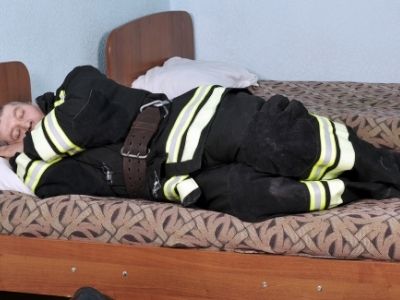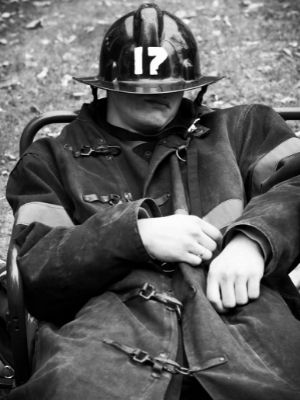It doesn’t matter whether it’s morning, noon, or night. When you call your local fire department, someone is always there to answer the call and respond to a fire. That has you wondering something. When do firefighters get the chance to sleep? Do they ever sleep at all?

Firefighters do sleep, as they’re human and require sleep to restore their energy. Most of the time, a firefighter will sleep at the fire station in a supplied bed, but they sleep when they’re home as well.
In this article, we’ll more closely examine the sleeping schedules of firefighters as well as where they sleep and for how long. There’s some interesting information to come, so make sure you keep reading!
Table of Contents
Do Firefighters Ever Sleep? When?
Although firefighters seem superhuman, they are indeed people just like everyone else.
No human being can go more than 264 hours max without sleep, and many more will succumb to exhaustion and/or deliria from insomnia long before the 264-hour mark.
Firefighters must sleep, but when they do it varies.
As we’ve talked about on the blog, firefighters will often work for periods of 24 hours at a time. Then they get at least two days off.
This schedule has largely replaced the 12-hour shift schedule where a firefighter works those shifts for up to four days at a time.
Now, when we say a firefighter is working for 24 hours, they’re not always out actively putting out fires. Rather, they spend as much of their shift as required being on-call at the station so they’re ready when a civilian or business needs help.
Those calls can come very frequently or every few hours. That depends on the season as well as the city or town.
Since the firefighter is still on shift, they can’t go home. However, if they have downtime, they can do what they wish at the fire station. Perhaps they’ll clean the engines or the station itself. They can cook, shower, and take a breather.
They can also sleep in designated sleeping quarters, and this is what many firefighters will do.
Most firefighters don’t have what many would call a standard sleep schedule. They sleep when they can, whether that’s the middle of the night, first thing in the morning, or at 3 o’clock in the afternoon.
Thus, it’s impossible to say when an average firefighter will sleep, especially when they’re on the clock.
When a firefighter isn’t working, they can sleep at night in their own bed should they want to.
How Many Hours of Sleep Does the Average Firefighter Get?
During their shift, a firefighter may have to stop what they’re doing at any time to go out to the latest fire. That includes sleeping.
Even when they’re on their scheduled time off, a firefighter can always be called back to the fire station.

How in the world does a firefighter get any amount of sleep, you ask?
The Department of Labor has sleep time deductions in a firefighter’s schedule. This deduction is eight hours per every 24 hours the firefighter is scheduled to work.
That means that if a firefighter worked 56 hours over the week, at least eight hours would be removed for sleeping. The time can be fewer than eight hours, but eight hours is the standard.
This rule only comes into play if the firefighter has been on-duty for longer than 24 hours. minutes at a time.
Thus, firefighters should be able to sleep for at least six to eight hours when they’re on the job. On their days off, they can sleep for 10 or 12 hours or longer if they wanted to. Again though, we must stress that a firefighter is always on call, so their sleep can be interrupted even on a day off.
How Do Firefighters Stay Energized on the Job?
With their long shifts, disruptive and unconventional sleeping schedules, and intensely hard work, how does a firefighter maintain their energy to carry out a 24-hour shift? Here are some methods they might utilize.
Prioritizing Sleep When Not Working
Although a firefighter likely has a thousand different tasks they’d like to complete around the house on their days off, they value the importance of sleep above all. They’ll use their two days off to restore their bodies with sleep.
When they come back to the fire station for their next 24-hour shift, they’ll feel focused, refreshed, energized, and ready to work.
Eating a Nutritious Diet
A firefighter knows that what they put into their body is the fuel that they use to do their jobs efficiently.
Thus, they’ll eat a balanced, nutritious diet full of vegetables, fruits, dairy, whole grains, and meats to ensure they get protein, healthy fats, fiber, and carbs. (That’s right, carbs aren’t all bad; they’re just energy!)
The long-term fuel a firefighter will derive from the vitamins, minerals, and nutrients in their diet keep them alert longer.
Limiting Caffeine
If a firefighter wanted to, they could live off of energy drinks to get through those 24-hour shifts. However, overdoing it on the caffeine can lead to some nasty side effects, including a pounding heart, anxiety, and jitters.

A firefighter’s job is strenuous and stressful enough. They don’t need to walk into a burning building with the above symptoms. That will compound how well they can do their job.
Plus, consuming caffeine in huge quantities will lead to an inevitable crash. This is more than a caffeine crash, but usually, a sugar crash as well since many energy drinks are bogged down with sugar.
Firefighters do consume caffeine, but usually in smaller quantities and from more healthful sources. For example, they may drink green tea, which won’t cause a sugar crash.
Drinking Water
Water might not contain caffeine, but it is our lifeblood considering we’re made of more than 50 percent water. Firefighters will prioritize consuming at least eight glasses of water per day that are eight ounces each.
Staying hydrated prevents body aches and muscle pain and also allows a firefighter’s body to recover faster from the rigors of the job.
Firefighters must sleep, but when they do depends on when they have the time and availability in their schedules. Between time off and mandated sleep time, a firefighter should be well-rested enough. However, duty always calls, and a firefighter must be ready to answer, even if they were sleeping!